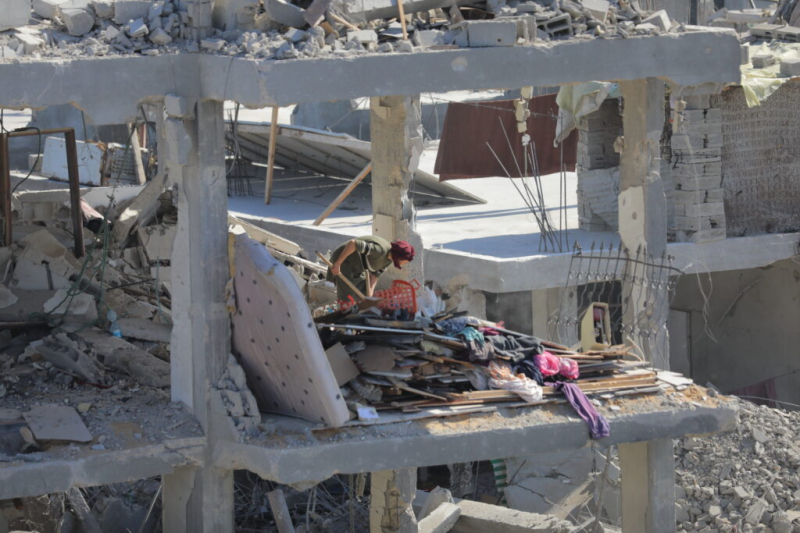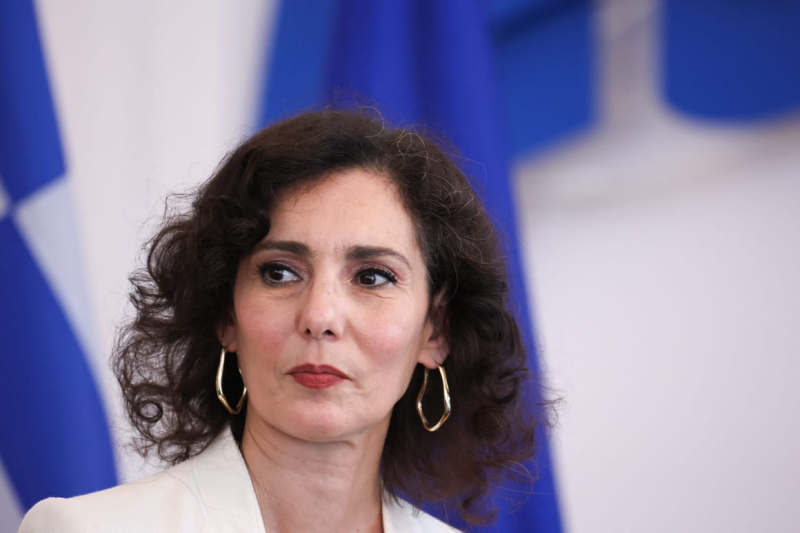Hadja Lahbib tells POLITICO she has ‘doubts’ about Netanyahu’s commitment to Trump’s ceasefire, and vows to keep up the pressure on Israel.
BRUSSELS — It’s not a view that many Brussels officials would dare to offer in public, but the European commissioner for crisis management is clear: Benjamin Netanyahu is not a convincing leader to deliver peace in the Middle East.
In an interview with POLITICO, Hadja Lahbib set out her “doubts” about the Israeli prime minister, called for continued pressure on Israel, and warned that the suffering of Palestinians in Gaza is far from over.
The biggest risk to a lasting peace, she said, is “extremists on both sides.”
There’s Hamas, the perpetrators of the Oct. 7, 2023 atrocity in Israel in which 1,200 people were killed. And on the Israeli side there are “extremists who don’t want to hear about the two-state solution,” she said, referring to the prime minister and members of his Cabinet. “We hear a lot of things that are unacceptable sometimes in the mouth of a responsible person who [is] in the lead of their country.”
Does she think Netanyahu wants peace? “To ask the question is to give an answer,” said Lahbib, who is Belgium’s EU commissioner. “I have some doubts. So far he was able to implement the ceasefire so let’s see what’s going to happen. But we all know that he was against the two-state solution … we used to say in French that ‘only idiots don’t change their minds.’”
The commissioner said she wasn’t calling the Israeli leader “an idiot,” but she’s clearly not a fan.
Asked if Israel would need to elect a new leadership that is ready to embrace the two-state solution, with a viable Palestinian state alongside a secure Israel, she replied: “That’s a very good question and these are the next steps, the crucial ones.” First must come a ceasefire, then urgently needed aid, “and then a future, give a horizon of hope for these people that are living now in a sea of rubble.”
It’s unusual for politicians to discuss the electoral politics of other countries. Israel is due to hold elections for its 120-member Knesset in October 2026, though some expect the vote to come sooner as Netanyahu no longer has a majority after his coalition partners walked out.
Netanyahu is known as the great survivor of Israeli politics and has vowed to stand for election again.
Trump’s truce
It’s been two weeks since the Trump-inspired ceasefire took effect, with Hamas returning Israel’s living hostages and Israeli forces pulling back. There have been attacks, and deaths, and tensions remain high. Overall, however, the truce has held.
For the European Union — the biggest overall aid donor to the Palestinians (Brussels has sent more than €500 million since Oct. 7, 2023) — a political question abides: Can it repair relations with Israel sufficiently to play a role in shaping the future of the Middle East?
Lahbib is responsible for the bloc’s vast central humanitarian aid budget and holds a key position in the EU’s response to the conflict. Soon, if the truce continues, attention will turn to the future political and physical reconstruction of Gaza.
International allies agree Hamas cannot continue to run the administration of Gaza.

Lahbib suggested Palestinians might need their own Nelson Mandela figure, a reference to Marwan Barghouti, a leading name in the Fatah party who has been in an Israeli jail since 2002. He has topped polls as the choice of Palestinians for a potential president.
“Maybe [Barghouti] might be someone who still has credibility and legitimacy for the Palestinian people,” she said. “And if [he’s] the new, let’s say, Nelson Mandela, who’s released and who’s capable to have on one side the trust of his people and to lead the region, his own people, to peace, that will be fantastic.”
Sanctioning Israel
Israel’s new ambassador to the EU has said it’s time for Brussels to drop its threats — to apply sanctions and suspend parts of the EU-Israel association agreement — and instead to restore the cooperation funds that have been halted. Lahbib rejects this.
“On the contrary,” Lahbib said. “The past two years show us that we need to have leverage.” America made progress on peace precisely because it has leverage, she said. “Sometimes we have to push our own friends.”
Asked whether she believes Israel has committed genocide in Gaza, Lahbib said “only a court can say.” She did, though, point to an independent U.N. investigation that found there “is or was a genocide committed,” and referenced the harrowing scenes recounted by aid workers.
“What happened there is inhuman and we need to recover our humanity,” she said.
The EU wants to be a “player” rather than just a “payer” in the reconstruction of Gaza. But the political situation in Israel means that giving the EU a role on Trump’s so-called board of peace is a complicated decision, she said. “The coalition is fragile and it’s difficult for them to take a decision that leads to peace, a sustainable peace.”
Trump and his top team are clearly committed to maintaining the ceasefire, and the U.S. president’s plan is “the end of a nightmare — we have to acknowledge the progress,” Lahbib said.
“But this is not the end of the war. For that we need to work on the implementation of the two-state solution. The situation is very fluid and fragile.”

